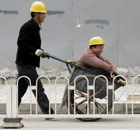Opinion
Rethink SOEs' role
(China Daily)
Updated: 2010-03-20 16:33
 |
Large Medium Small |
Widespread public complaints against aggressive land appropriation by major State-owned enterprises (SOEs) demand that their role in the national economy be reviewed comprehensively instead of being met with half-hearted response from SOEs' supervisor, the State Assets Supervision and Administration Commission (SASAC).
On Wednesday, the SASAC told 78 centrally administered SOEs, whose core businesses did not include property development, to withdraw from the real estate sector. But without a specific deadline for the withdrawal, the SASAC's statement amounts to nothing more than a light rap on the knuckles. It can hardly make big SOEs giving up their quest to make profits from the overheated housing market.
Worse, it could encourage some State enterprises to expedite their land appropriation before a definite ban is imposed on them.
| ||||
There is no dearth of bitter lessons of how housing bubbles can cripple one economy after another across the world. And more often than not the participation of government-supported agencies in the mainland's realty market has worsened the situation.
The SASAC is thus obliged to ensure the safety of State assets for the long-term health of the national economy. That means it should not allow any SOE to make short-term profit at the cost of the economy.
And the 16 major State enterprises exempted from withdrawing from the realty market - because property development is considered their core business - should use their profits to build subsidized houses for low-income families or limit their housing prices to fulfill their strategic role of stabilizing the real estate market.













